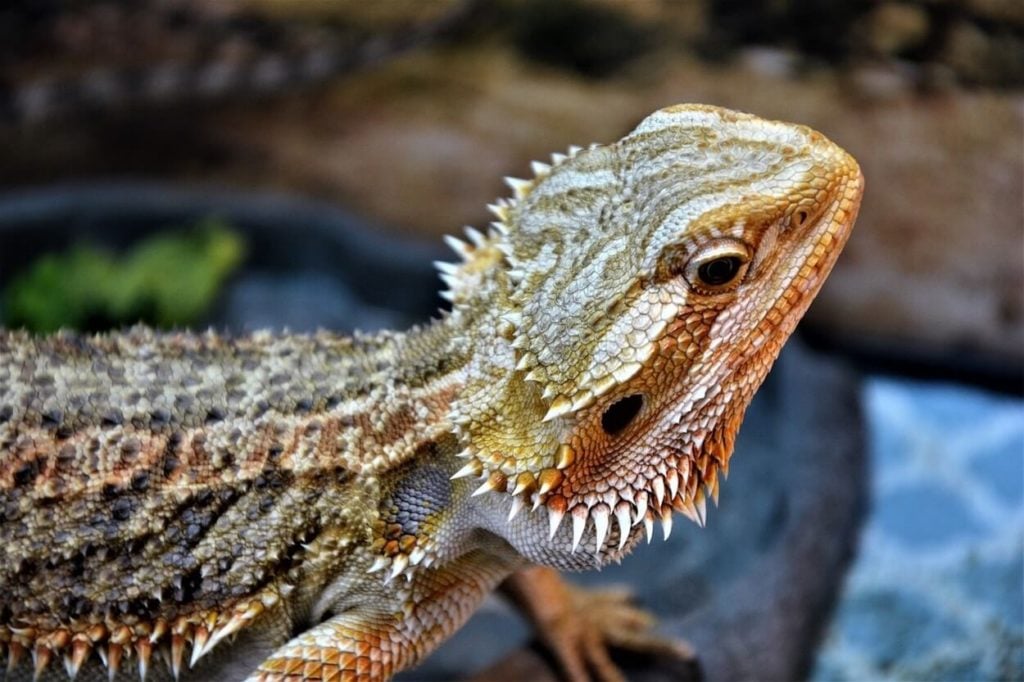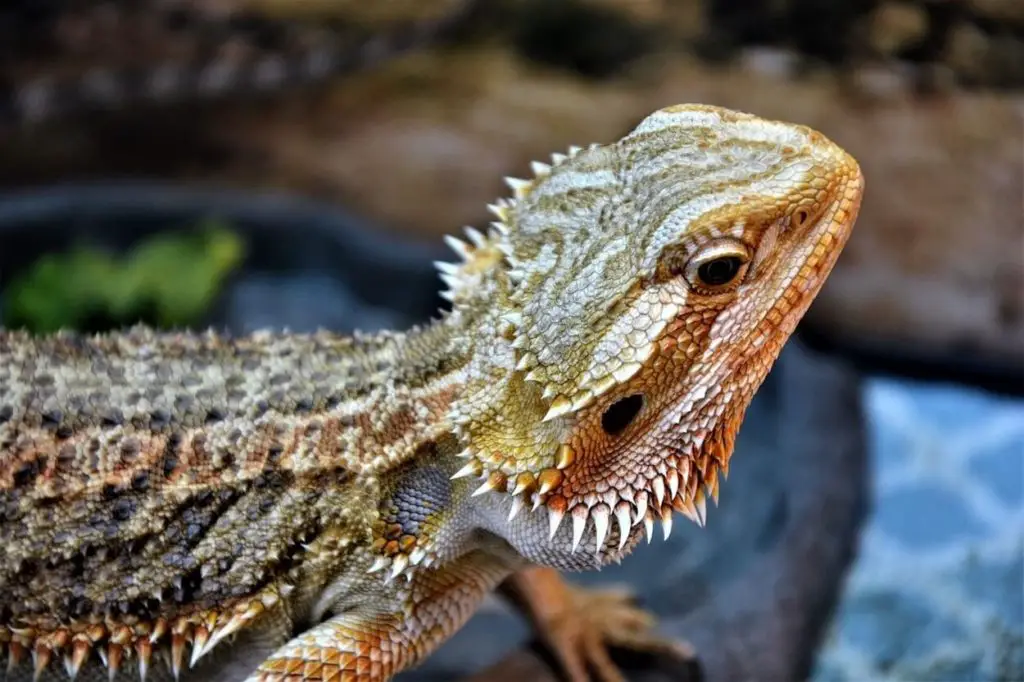Have you ever wondered why your bearded dragon is bobbing its head at you? It may seem like a strange behavior, but it’s actually quite common among these reptiles.
Bearded dragons are known for their unique personalities and behaviors, and head bobbing is just one of them. In this article, we will explore the reasons why your bearded dragon may be bobbing its head and what it could mean for their health and well-being. So, let’s dive in and decode your bearded dragon’s head bobbing behavior!

Why is My Bearded Dragon Bobbing His Head at Me?
Bearded dragons are fascinating creatures with unique behaviors that can often be confusing to their owners. One of the most common behaviors that bearded dragons exhibit is head bobbing. If you’ve ever witnessed your bearded dragon bobbing its head at you, you may be wondering what it means. In this article, we’ll explore the possible reasons why your bearded dragon is bobbing its head and what you can do about it.
1. Communication
Bearded dragons use head bobbing as a way to communicate with each other and with their owners. When a bearded dragon bobs its head, it can be a sign of dominance, submission, or even a friendly greeting. If your bearded dragon is bobbing its head at you, it may be trying to communicate something to you.
The frequency and speed of the head bobbing can also provide clues as to what your bearded dragon is trying to say. Rapid head bobbing is often a sign of aggression, while slower head bobbing can be a sign of submission or a friendly greeting.
2. Mating Behavior
Another reason why your bearded dragon may be bobbing its head is related to mating behavior. Male bearded dragons will often bob their heads to impress a female during courtship. This behavior is also accompanied by other displays such as puffing up their throat and displaying their beard.
If you have a male bearded dragon and notice him bobbing his head at you, it may be a sign that he sees you as a female and is trying to impress you.
3. Environmental Factors
Environmental factors can also play a role in why your bearded dragon is bobbing its head. Changes in temperature, lighting, or even a new object in their environment can cause a bearded dragon to become stressed and exhibit head bobbing behavior.
It’s essential to ensure that your bearded dragon’s environment is suitable for them and that they have everything they need to thrive. This includes proper lighting, temperature, and the right amount of space.
4. Illness or Injury
In some cases, head bobbing can be a sign of illness or injury. If your bearded dragon is exhibiting other symptoms such as lethargy, loss of appetite, or difficulty breathing, it’s essential to take them to a veterinarian as soon as possible.
Head bobbing can also be a sign of a neurological issue, so it’s crucial to get a professional diagnosis if you suspect something is wrong.
5. Excitement or Agitation
Sometimes, bearded dragons will bob their heads out of excitement or agitation. This can happen if they see something they want to chase or catch, or if they’re feeling threatened by something in their environment.
If your bearded dragon is bobbing its head in a way that seems playful, it may be a sign that they’re feeling happy and energetic. However, if they seem agitated or stressed, it’s important to address the underlying issue to prevent further distress.
6. Socialization
Bearded dragons are social animals and require interaction with their owners to thrive. If your bearded dragon is bobbing its head, it may be a sign that they’re seeking attention or trying to initiate playtime.
Taking the time to socialize with your bearded dragon regularly can help prevent unwanted behaviors like head bobbing. It’s also essential to provide them with plenty of stimulation and enrichment in their environment to keep them happy and healthy.
7. Hormonal Changes
Like many animals, bearded dragons undergo hormonal changes throughout their lives. These changes can cause them to exhibit new behaviors such as head bobbing.
If your bearded dragon is going through a hormonal change, it’s important to be patient and understanding. These changes are a natural part of their development and will likely pass with time.
8. Natural Instincts
Finally, head bobbing can be a natural behavior for some bearded dragons. In the wild, head bobbing is often used as a way to communicate with other members of their species.
If your bearded dragon is exhibiting head bobbing behavior, it may be a sign that they’re simply following their natural instincts. As long as they’re otherwise healthy and happy, there’s likely nothing to worry about.
Conclusion
In conclusion, head bobbing is a common behavior that bearded dragons exhibit for a variety of reasons. It’s essential to pay attention to the frequency and speed of the head bobbing to determine what your bearded dragon is trying to communicate.
If you’re ever unsure about why your bearded dragon is bobbing its head, it’s always a good idea to consult with a veterinarian or an experienced reptile owner. With proper care and attention, your bearded dragon can live a long and happy life.
Frequently Asked Questions
Bearded dragons are fascinating creatures that make great pets. They are known for their quirky behavior, which can sometimes be confusing to their owners. One of the most common questions that bearded dragon owners ask is why their pet is bobbing their head at them. Here are five questions and answers that will help you understand why your bearded dragon might be bobbing their head at you.
What does it mean when a bearded dragon bobs its head?
When a bearded dragon bobs its head, it is usually a sign of dominance or aggression. This behavior is most commonly seen in males, especially during breeding season. If your bearded dragon is bobbing its head at you, it might be trying to establish dominance over you. However, it’s important to note that this behavior can also be a sign of excitement or curiosity, especially if your bearded dragon is still young.
If you’re not sure what your bearded dragon’s head-bobbing means, pay attention to other signs of aggression, such as puffing up their beard or hissing. If your bearded dragon seems calm and relaxed, they might just be trying to get your attention or show their interest in you.
Is head-bobbing a normal behavior for bearded dragons?
Yes, head-bobbing is a normal behavior for bearded dragons. It is a natural part of their communication and is often used to establish dominance or show excitement. However, it’s important to remember that not all bearded dragons will display this behavior, and some may do it more frequently than others.
If your bearded dragon is head-bobbing excessively or seems to be doing it for no reason, it might be a sign of stress or illness. Make sure your bearded dragon’s living conditions are appropriate and that they are receiving proper nutrition and care.
Can head-bobbing be a sign of illness?
Yes, excessive head-bobbing can be a sign of illness in bearded dragons. If your bearded dragon is bobbing their head more frequently than usual or seems to be doing it for no reason, it could be a sign of a respiratory infection or other health issue.
Other signs of illness in bearded dragons include lethargy, loss of appetite, weight loss, and abnormal behavior. If you’re concerned about your bearded dragon’s health, it’s important to take them to a veterinarian who specializes in reptiles.
How can I tell if my bearded dragon is happy?
There are several signs that indicate a bearded dragon is happy and healthy. These include clear eyes, a healthy appetite, regular bowel movements, and a willingness to explore and interact with their environment.
Bearded dragons that are happy and content will also display relaxed body language, such as a flattened body and a relaxed tail. They may also bask in the sun or under their heat lamp, which is a sign that they are comfortable in their environment.
What can I do to make my bearded dragon less aggressive?
If your bearded dragon is displaying aggressive behavior, there are several things you can do to help them feel more comfortable and relaxed. First, make sure their living conditions are appropriate and that they are receiving proper nutrition and care.
You can also try spending more time with your bearded dragon and handling them gently and consistently. This will help them get used to your presence and feel more comfortable around you. If your bearded dragon is still displaying aggressive behavior, it’s important to seek the advice of a veterinarian or reptile specialist.
Bearded Dragon Head Bobbing | Is This A Problem? 3 Common Reasons Explained
In conclusion, if you are a bearded dragon owner and you notice your pet bobbing its head at you, you may be wondering what it means. There are several reasons why your bearded dragon may be bobbing its head, including territorial behavior, mating behavior, or simply trying to communicate with you.
It is essential to observe your bearded dragon’s body language and behavior to determine the reason behind the head-bobbing. If your pet is showing signs of aggression, it is best to give it some space and avoid handling it until it calms down. However, if your bearded dragon is friendly and seeking attention, you can interact with it and offer it some treats to strengthen your bond.
Overall, bearded dragons are fascinating creatures that can communicate with their owners in their unique ways. Understanding their behavior and body language can help you provide the best care and companionship for your pet.


